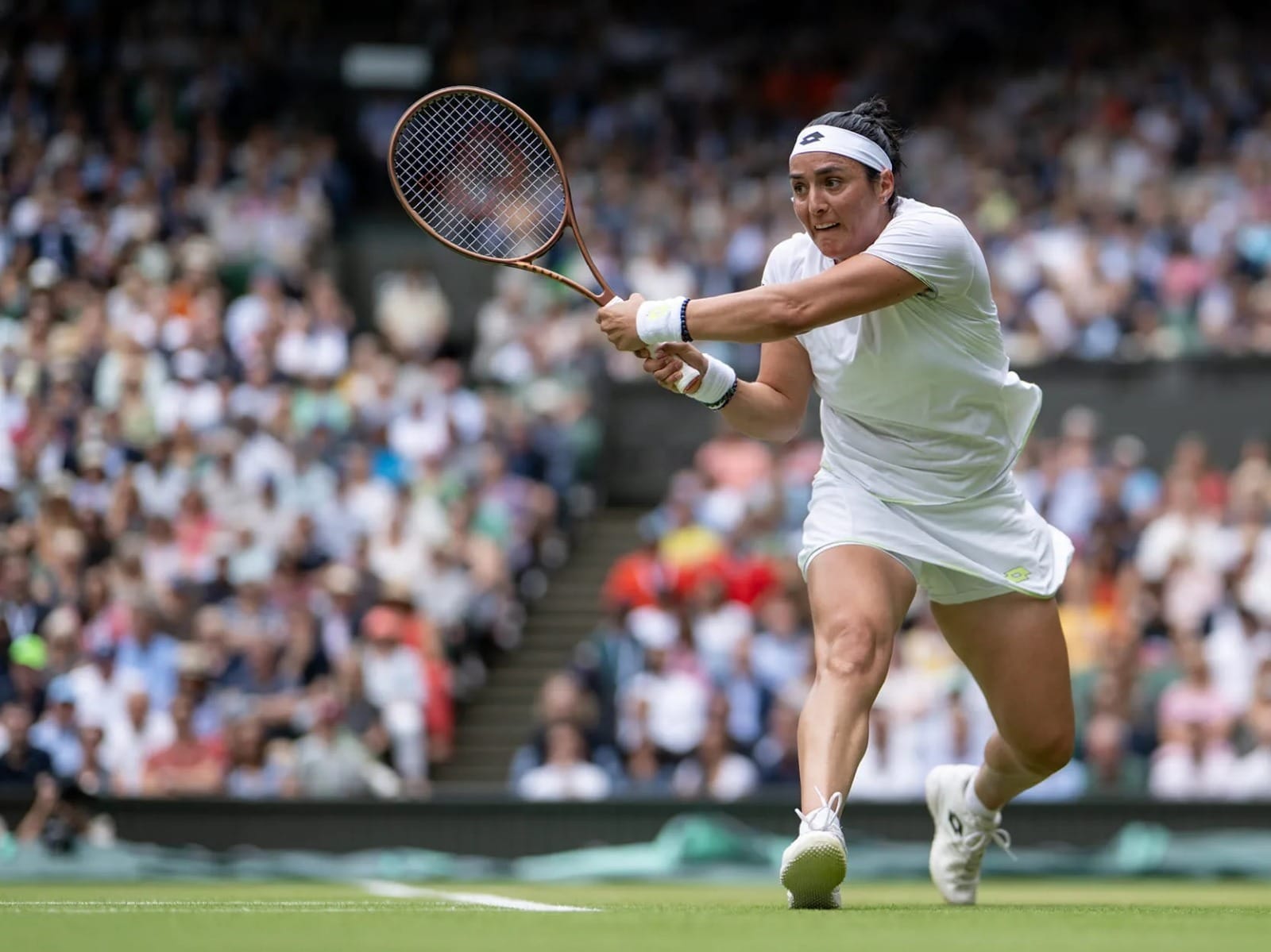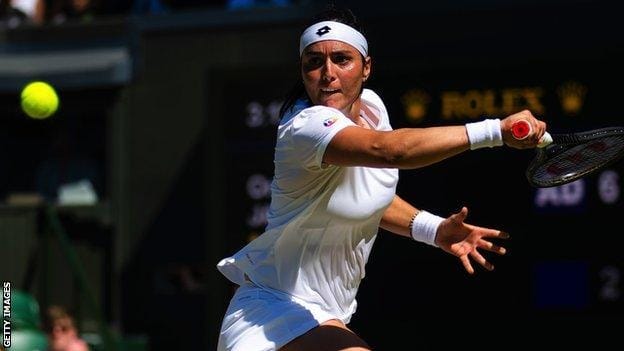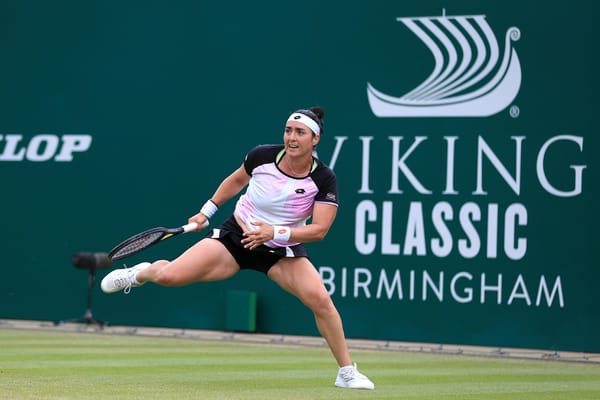In Summary
- Ons Jabeur rose from humble beginnings in Ksar Hellal to become Africa’s most successful female tennis player, rewriting history for Arab and African women in global tennis.
- A three-time Grand Slam finalist and WTA 1000 champion, Jabeur became the first African and Arab woman to reach the world’s No. 2 ranking.
- Balancing faith, philanthropy, and resilience, Jabeur inspires a new generation of African athletes through her advocacy for gender equality and youth sports development.
Deep Dive!!
Lagos, Nigeria, Tuesday, October 28th— Ons Jabeur is one of the rare talents that emerged from Africa in the beautiful game of tennis. Hailing from Tunisia, she has become a global sensation, all the way from a small North African town to the grand stages of Wimbledon and the US Open.
Ons Jabeur stepped onto the court, dismantled obstacles, changed attitudes, and elevated the Arab world to the forefront of tennis worldwide. She has a career full of grace, resilience, and an unwavering belief that ambitions, no matter how unlikely, are worth pursuing.
It is safe to name Ons Jabeur as one of the most accomplished African Tennis players of the Open Era, and in this deep dive, we are going to find out why as we explore her life and legacy.
Ons Jabeur’s Early Life and Background
Ons Jabeur was born in the Tunisian village of Ksar Hellal on August 28, 1994. Although tennis was not very popular in the seaside city of Sousse, where she grew up, sports were a regular occurrence. When Ons was three years old, her mother, Samira, took her to the neighbourhood tennis club, where she quickly developed a deep affection for the game.
Her family, which also included her two older brothers, an older sister, and her father, didn't have a lot of money, but they made up for it with their support. From the start, Ons' mother saw her potential and frequently took her around Tunisia for competitions and training.
From the age of four to thirteen, Jabeur practised in a nearby school tennis centre and then at hotel courts under coach Nabil Mlika. She relocated to Lycée Sportif El Menzah, a national sports high school for top athletes, in Tunisia when she was twelve years old.
She moved to Belgium and France for more intensive training when she was sixteen, where she was able to hone her skills in more competitive settings. Her future success was paved with her early commitment, which combined Tunisian perseverance with global recognition.
Junior Career: Building a Foundation for Greatness
Jabeur's success as a professional was predicted by her junior career. At the age of 13, she made her ITF Junior Circuit debut in 2007 and won her maiden doubles championship with Nour Abbès in Lebanon. In 2009, she won her first singles match at the Fujairah ITF Junior Tennis Championships in the United Arab Emirates.
She advanced to the Wimbledon quarterfinals in 2010 and lost to Elina Svitolina in the French Open girls' singles final. In 2011, after a five-month break due to surgery on her left wrist in November 2010, Jabeur won the French Open girls' singles title, making history as the first Arab and North African female to win a junior Grand Slam and the first Tunisian since Ismail El Shafei in 1964. She and Ashleigh Barty also won the Grade 1 Junior International doubles title in Roehampton.
Professional Career Highlights and Achievements

Jabeur started competing on the ITF Women's Circuit in 2008 at the age of 14, turning pro in 2010. In 2012, she made her WTA Tour main-draw debut as a wildcard at the Qatar Ladies Open, where she was defeated by Virginie Razzano. She defeated Zheng Jie in an early highlight to earn a spot at the Dubai Tennis Championships that year.
Jabeur finished 2012 ranked No. 260, indicating that the early years were difficult. She participated in qualifying for the French Open and progressively increased her ranking by winning ITF tournaments. After making it to the third round of the French Open as a lucky loser, she defeated top-10 player Dominika Cibulková in 2017, marking her first appearance in the top 100.
Jabeur earned a Wimbledon wildcard in 2018 after winning her first 100k championship at the Manchester Trophy. She defeated three players in the top 25 to go to the Kremlin Cup final, and at year's end, she was ranked No. 62 in the top 100.
The late 2010s and early 2020s saw Jabeur's real breakthrough. She upset Caroline Garcia in the third round of the 2019 US Open and peaked at No. 51. As the first Arab woman to accomplish this at a Grand Slam, she made history in the 2020 Australian Open quarterfinals and finished the year ranked No. 31.
The year 2021 was crucial since she became the first Arab woman to win a WTA title at the Birmingham Classic. She defeated Venus Williams and Garbiñe Muguruza to advance to the quarterfinals at Wimbledon. She later advanced to the semifinals at Indian Wells and achieved her top 10 debut.
Jabeur became the first African to win a WTA 1000 title when he won the Madrid Open in 2022. After winning the Berlin Open, she advanced to the Wimbledon and US Open finals, becoming the first Arab and African woman to do it. She reached a career-high ranking of No. 2 on June 27, 2022.
Additional achievements in 2023 included victories at the Charleston Open and Ningbo Open, as well as another Wimbledon final and appearance in the WTA Finals.
Beyond honours, Jabeur was awarded the National Order of Merit in Tunisia in 2022 and the Arab Woman of the Year in sports award in 2019. She also won medals at the Pan Arab Games and the All-Africa Games in 2011 (gold in singles and team; silver in doubles).
Grand Slam Performances: Chasing the Ultimate Prize

Jabeur's Grand Slam record is impressive, with three finals but no title yet:
- Australian Open: Quarterfinals (2020), Third round (2021, 2025)
- French Open: Quarterfinals (2023, 2024), Fourth round (2020)
- Wimbledon: Finals (2022, 2023), Quarterfinals (2021)
- US Open: Final (2022), Fourth round (2023)
She has represented Tunisia at the Olympics (2012, 2016, 2020) and holds a strong Fed Cup record (37–13).
Personal Life & Philanthropy
Jabeur is a devout Muslim who periodically modifies her schedule for Ramadan. She is married to Karim Kamoun, a former Russian-Tunisian fencer who has been her fitness coach since mid-2015. She has discussed postponing family planning because of tennis obligations and strikes a balance between her beliefs and her career.
In terms of philanthropy, Jabeur supports gender equality and youth tennis initiatives in addition to helping to launch the WTA 250 in Monastir, Tunisia, in 2022.
Injuries and inconsistent play plagued Jabeur's 2025 campaign. Despite respiratory issues, she advanced to the third round of the Australian Open, although she left early at the French Open and retired in the middle of a Wimbledon match because of an injury.
She declared a break in July, citing a need to overcome obstacles and recover pleasure, despite having a 15-15 win-loss record. Supporters look forward to her possible comeback, hoping for more momentous occasions.
We value your thoughts. If you have comments or feedback about this article, reach out to our Editor-in-Chief at editor@dissimilarmedia.com


Related News
Relive the Greatest African Coaching Rivalries of All Time
Feb 16, 2026
Top 10 Most Successful CAF Champions League Clubs in History
Feb 15, 2026
From Bambali to the World — How Sadio Mané Announced His Arrival to Football’s Global Stage
Feb 10, 2026